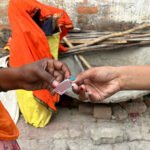Aaheli Gupta
SENIOR PROJECT COORDINATOR
Farrah is a victim of commercial sexual exploitation who the team has been following up with 2017. In January 2020, the social worker met Farrah, now 19 years old, and officially closed the case after conducting a few exit sessions with her. The understanding was that the organisation would support as and when needed but will phase out of continuous interventions. She was asked to contact the organizations if in need of assistance.
Farrah was eight months pregnant during the lockdown. The social worker called Farrah to check how she was doing and connected her to relief material a few times.
On the 15th of May, 2020, the social worker received a call from Farrah late in the evening. She was in labor and the social worker spoke with one of her friends, who she lived with. They were asked to rush her to the nearest Hospital. Farrah reached the hospital but she wasn’t allowed to get admitted and was informed that only COVID-19 patients were being admitted at the Hospital. The social worker tried to comfort Farrah over the phone and directed her friends to two other Hospitals but she was denied admission for the same reasons. Farrah also went to a private clinic where she was asked to pay Rs 15,000 for the delivery. The social worker asked to get on a call with the doctor but the doctor refused and then asked them to leave.
The social worker contacted another Hospital which was a little far away from the previous Hospital. Details of the case were given to the Hospital staff over the phone after which Farrah was asked to reach the hospital and get admitted.
Farrah gave birth to a baby girl on the 16th of May in the morning. The social worker congratulated her and discussed the need for Farrah to take care of her health and her child especially during the lockdown. The Hospital Staff had asked her to stay in the hospital for two days to conduct a few tests.
There are several challenges that a social worker faces in assisting the people who they work with, during the lockdown, and not getting proper medical assistance is one of the major challenges. In current times, reaching a Hospital can be a major concern for anyone especially those from low-income households due to lack of transport. To make things worse, being denied to be admitted to delivering a baby or not being provided information about the nearest hospital where the patient can be provided assistance can cause harm to those with limited access to resources.
This case also reiterated how casework is adapting to the times. Casework has not stopped because the social worker is not on the field, instead, it has transitioned to keep assisting its clients remotely. The casework employed the principle of resource utilization and helped establish linkages to help Farrah. This principle seeks that all available resources within a community or society must be utilized to assist the person in need. Since the caseworker could not be present to help Farrah, she reached out to the hospitals, spoke with doctors, and also coordinated with Farrah’s friends to provide assistance to the best of the organization’s abilities at the current time. The principle of individualization is also applicable in this situation as this was a unique situation that is not faced by the caseworkers frequently. It required the presence of mind, and adaptability to the situation in a calm manner.
This case highlighted how the role of a social worker evolves amid a crisis, and how assistance can be delivered despite the distance, in the most unusual of circumstances.










Follow